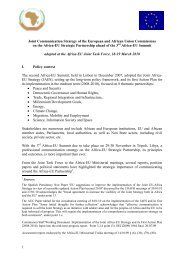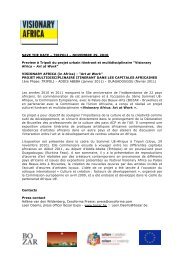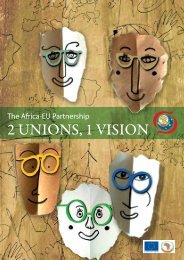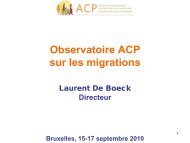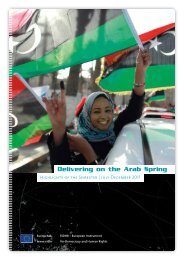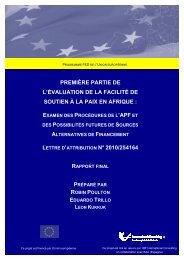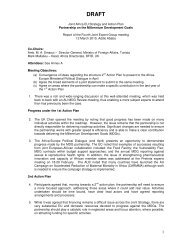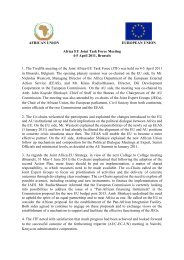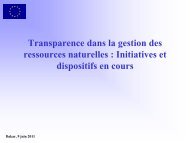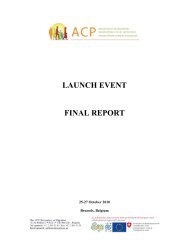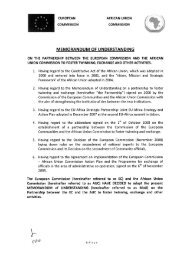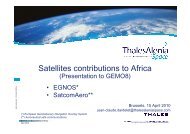part 1 of the african peace facility evaluation - European ...
part 1 of the african peace facility evaluation - European ...
part 1 of the african peace facility evaluation - European ...
Create successful ePaper yourself
Turn your PDF publications into a flip-book with our unique Google optimized e-Paper software.
In that case, one possible alternative funding solution for <strong>the</strong> APF would be <strong>the</strong> CFSP - <strong>the</strong> only<br />
budget with ‘military support’ possibilities - with additional complementary funding from DCI for <strong>the</strong><br />
non-PSO and non-ASF <strong>part</strong>s <strong>of</strong> APSA. Never<strong>the</strong>less, under <strong>the</strong> CFSP as currently constituted, Africaled<br />
operations appear problematic and current CFSP procedures seem unlikely to support <strong>the</strong> EU’s<br />
African policy based on JAES <strong>part</strong>nerships and increasing African ownership.<br />
If <strong>the</strong> EDF were to be absorbed under <strong>the</strong> EU budget, <strong>the</strong> APF could only fit into <strong>the</strong> CFSP, but this<br />
would be tricky, even with complementary funding from DCI. For <strong>the</strong> APF to successfully fit into <strong>the</strong><br />
CFSP, while maintaining <strong>the</strong> JAES <strong>part</strong>nership strategy and respecting <strong>the</strong> Paris Declaration <strong>of</strong> 2005<br />
and <strong>the</strong> Accra Agenda, would require <strong>the</strong> Council to adjust <strong>the</strong> mandate and tools <strong>the</strong> CFSP.<br />
The <strong>European</strong> Council is a core institution for <strong>the</strong> CFSP, given that it defines its «principles and<br />
general guidelines». Under <strong>the</strong> Amsterdam, Maastricht and Lisbon Treaties, <strong>the</strong> Council plays <strong>the</strong><br />
guiding role. The <strong>European</strong> Council adopts strategy documents such as <strong>the</strong> <strong>European</strong> security<br />
strategy. The Council uses different planning processes than <strong>the</strong> Commission, which makes<br />
coordination difficult. The Council would have to carefully consider in what way CFSP regulations<br />
should be changed in order to accommodate <strong>the</strong> needs <strong>of</strong> APF and APSA, in line with <strong>the</strong> objectives<br />
<strong>of</strong> EU foreign policy and <strong>the</strong> JAES.<br />
Moreover <strong>the</strong>re are financial constraints on <strong>the</strong> current EU budget, which may not increase by more<br />
than 4% per year. This limit may hamper <strong>the</strong> inclusion <strong>of</strong> such a large fund as <strong>the</strong> APF into <strong>the</strong> budget,<br />
at least all at once. This might very well lead <strong>the</strong> Commission, <strong>the</strong> Council and EU MS to reach a very<br />
different conclusion on <strong>the</strong> destiny <strong>of</strong> APF.<br />
For this and o<strong>the</strong>r reasons, EU MS could decide that APF should be made a separate Instrument, to<br />
be implemented by <strong>the</strong> EC. A new financial instrument with its own procedures, following <strong>the</strong><br />
precedent created by <strong>the</strong> A<strong>the</strong>na Decision, could take into account <strong>the</strong> requirements on African<br />
ownership and African led PSOs as established in APSA. The DCI, EDF, CFSP budget, and APF<br />
would <strong>the</strong>n be separate. That would require a Council Decision, but is definitely an option to be<br />
considered for implementing <strong>the</strong> EU’s Africa foreign policy and <strong>the</strong> JAES that is currently built around<br />
<strong>the</strong> construction <strong>of</strong> long-term pan-African institutions (AU, RECs).<br />
Whatever <strong>the</strong> main EU instrumental and budgetary decisions, <strong>the</strong> opportunity for AU co-funding <strong>of</strong><br />
APSA appears to bear no disadvantages. The African Peace Fund may grow and may even be<br />
incorporated into an African owned APF or – in <strong>the</strong> long term – APF might merge into <strong>the</strong> Peace Fund.<br />
The EU should study ways to advance <strong>the</strong>se long-term perspectives. The ongoing EU-AU political<br />
dialogue is <strong>the</strong> forum for <strong>the</strong>se ideas to be explored by <strong>the</strong> JCC.<br />
At this stage, <strong>the</strong> option <strong>of</strong> UN funding - following <strong>the</strong> ideas <strong>of</strong> <strong>the</strong> Prodi Panel – appears to <strong>of</strong>fer much<br />
less sustainable funding than <strong>the</strong> APF, but entails no apparent political disadvantages. A new<br />
discussion paper is expected from <strong>the</strong> Secretary General in <strong>the</strong> course <strong>of</strong> 2011, focusing on<br />
‘comparative advantage and collective security’ in making and maintaining <strong>peace</strong> in Africa. Following<br />
<strong>the</strong> publication <strong>of</strong> this paper, EU and AU MS will have a chance to discuss <strong>the</strong> mechanisms both for<br />
implementing and funding African PSOs and <strong>the</strong> various elements <strong>of</strong> APSA.<br />
Ensuring reliable funding for <strong>the</strong> African Peace Fund or – if that is <strong>the</strong> political decision – merging<br />
different existing and potential funds, create alternative possibilities for <strong>the</strong> EU to support <strong>the</strong> AU. The<br />
African Peace Fund and APF could be combined. It may ensure that African countries make a sincere<br />
effort in a critical area to development, and tentative political discussions in this sense should be<br />
engaged.<br />
Page 48 <strong>of</strong> 49




